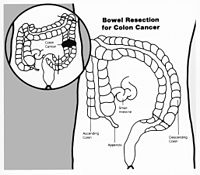
Photo from wikipedia
Abstract Background Surgery is recommended for patients with high-risk submucosal invasive rectal cancer (SM-RC) after local resection. However, surgery affect patient’s quality of life due to stoma placement and impaired… Click to show full abstract
Abstract Background Surgery is recommended for patients with high-risk submucosal invasive rectal cancer (SM-RC) after local resection. However, surgery affect patient’s quality of life due to stoma placement and impaired anal function. Thus, alternative treatments to prevent local metastasis are anticipated. This study assessed the safety of adjuvant chemoradiotherapy with capecitabine for patients with high-risk SM-RC after local resection. Methods This single-arm, multicenter, phase II trial enrolled patients with high-risk SM-RC who underwent local resection within 12 weeks prior to enrollment. High-risk SM-RC was defined as the presence of at least one of the following factors: poor differentiation of adenocarcinoma, ≥ 1mm of submucosal invasion, presence of lymphovascular invasion, and grade 2 or 3 of tumor budding. Protocol treatment included 45.0 Gy radiotherapy with conventional fractionation and 825 mg/m2 capecitabine administered twice daily until the completion of radiotherapy. The primary endpoint was treatment completion rate, with an expected rate of 95% and a threshold of 80%. This study was registered with the University Hospital Medical Information Network, number UMIN000016785. Results A total of 29 patients from six institutions were enrolled between May 2015 and February 2018. One patient was ineligible. Twenty-three patients completed treatment with a completion rate of 82% (80% confidence interval; range, 69%–91%). The remaining five patients also completed treatment with protocol deviation from the planned treatment schedule. The mean relative dose intensity of capecitabine was 89% (range, 58%–100%). The most common adverse events were radiation dermatitis (54%), anal pain (39%), and anal mucositis (29%). No grade 3 or higher adverse events were reported. Conclusions Adjuvant chemoradiotherapy using capecitabine demonstrated manageable safety in patients with high-risk SM-RC after local resection. Clinical trial identification UMIN000016785. Legal entity responsible for the study The authors. Funding The National Cancer Center Research and Development Fund (25‐A‐12) to Dr Saito. Disclosure All authors have declared no conflicts of interest.
Journal Title: Annals of Oncology
Year Published: 2019
Link to full text (if available)
Share on Social Media: Sign Up to like & get
recommendations!